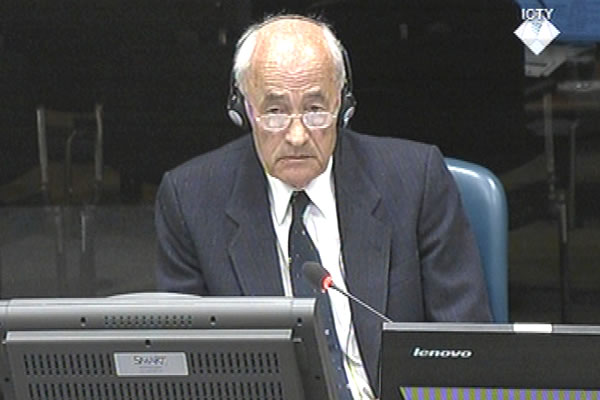Home
‘VULNERABLE CATEGORIES’ MOVED OUT VOLUNTARILY
Ratko Mladic’s defense witness contends that the Crisis Staff of the Autonomous Region of Krajina allowed ‘vulnerable categories to move out voluntarily’. This comprised women, children and the elderly. This was so only on paper: in practice, ‘everyone who wanted could move out’, Nikola Erceg said, disregarding the prosecutor’s suggestion that thousands of Muslims and Croats couldn’t move anywhere because they were held in prison camps
 Nikola Erceg, defence witness at Rako Mladic trial
Nikola Erceg, defence witness at Rako Mladic trial Through the evidence of Nikola Erceg, former member of the Autonomous Region of Krajina Crisis Staff, Ratko Mladic’s defense tried to prove that the Bosnian Serb policies weren’t aimed at ‘forcible or any other kind of expulsion or persecution of the people’.
At the beginning of Erceg’s evidence, defense counsel Branko Lukic read out the summary of his statement. The defense counsel listed the numerous duties the witness held. In the statement, Erceg claims that municipalities evinced a ‘high degree of independence’ vis-à-vis the ARK. Also, Erceg notes that the property of those non-Serbs who left the Krajina region was handed over temporarily to Serb refugees.
In the cross-examination, the witness confirmed his testimony in Radovan Karadzic’s defense. At Karadzic’s trial, Erceg claimed that he ‘didn’t know anything about the military’ and that the communications between Banja Luka and Pale were disrupted.
The prosecutor on the other hand argued that the communications functioned and that the instructions about the activities of the crisis staffs issued by the Republika Srpska prime minister Branko Djeric could and did pass through the ‘impenetrable barriers’ and reach the leading ARK figures. Erceg first claimed that he had seen the document for the first time a couple of days ago as he was preparing for the testimony, but eventually he agreed that he may have seen the document earlier, ‘on a screen’. He also agreed that the communications between Banja Luka and Pale were not disrupted in late May or June 1992.
The prosecutor quoted a Crisis Staff decision, issued in June 1992, which shows that ‘only women, children and the elderly were able to move out from the ARK territory’. Thousands of Muslims and Croats who wanted to leave the ARK couldn’t do it because they were held in prison camps, the prosecutor put it to the witness. Erceg stressed that it ‘is impossible that all of them were detained’ because ‘some of them were able to walk on the streets of Banja Luka normally’. The witness accepted the suggestion that the document spoke solely about ‘vulnerable categories’ of the population. In practice it was different because ‘anyone who wanted to move out could do so’, Erceg said.
In his statement to the defense, Erceg described the conflict that broke out, pitting the ARK leadership and the ‘separatists in Banja Luka’ against the Pale authorities. The prosecutor noted that the conflict was resolved by February 1992, when the ARK Assembly deputies voted in unanimously the RS president Radovan Karadzic’s report on the political situation. They also adopted the Constitution. Erceg contradicted the facts, claiming that ‘separatist views were espoused throughout the war’; in fact, even now, in peacetime, they still exist.
Speaking about the Bosnian Serb strategic goals, Erceg said that the ‘first strategic goal of the Bosnian Serbs’ was to ‘remain in the same state’. The prosecutor remarked that it wasn’t mentioned on the list of the six goals that included ethnic separation, establishment of a corridor in Posavina, the removal of the border on the Drina river, establishment of borders on the Una and Neretva rivers, the carve-up of Sarajevo and access to the sea. Erceg eventually admitted that the Republika Srpska Army was supposed to accomplish those strategic goals. The accused Mladic headed the VRS army.
Linked Reports
- Case : Mladic
- 2015-03-31 LARKS’ DIRTY JOBS
- 2015-03-30 PELEMIS WILLING TO COME TO SARAJEVO BUT…
- 2015-03-27 PROSECUTION WILL REOPEN ITS CASE TO CALL TOMASICA EVIDENCE ON 22 JUNE 2015
- 2015-04-02 MLADIC’S ROUTE FROM SREBRENICA TO HAN PIJESAK
- 2015-04-07 PEOPLE FROM SREBRENICA ‘KILLED EACH OTHER’
- 2015-04-08 WHAT WITNESS DIDN’T SEE IN KONJEVIC POLJE
